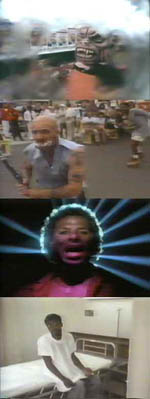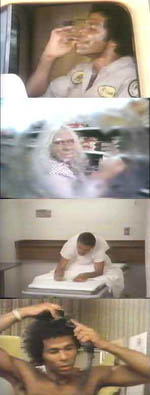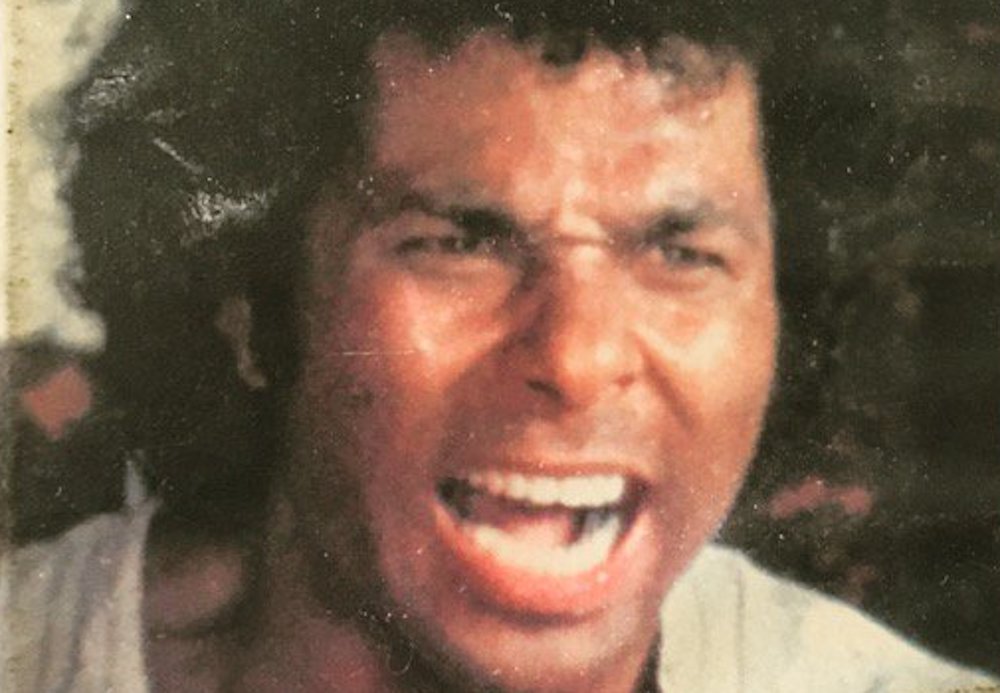73 min. / Directed by Oscar Williams
The formula must have seemed like the makings of a hit: take a few up-and-coming black character actors, the writer of Superfly and mix it up with the timely issue of drug abuse. Unfortunately the final result, Death Drug, has slowly grown into the biggest cult sensation this side of Reefer Madness. No wait, it’s even worse than Reefer Madness.

Philip Michael Thomas plays a blue collar worker struggling to succede in his music career. He finally gets a big break when a record company signs him up and promises that he’ll become the next Donna Summers. Donna Summers?. Philip is so overjoyed by the news that he decides go to a disco club with his white friends where he meets up with a skinny drug dealer in the lavatory. Thomas just needs some weed but the dealer hands him a free sample of the sherm, the whack, angel dust, the good stuff, etc. The dealer remarks that it will “put more dips in your hip and more cut in your strut” and that it’ll take a parachute to get him down. Thomas must consider these admirable traits for a recreational drug because he immediately smokes the stuff, leading to the film’s first hallucination where a white woman turns into a black girl by way of (poorly-timed) dissolve.
Meanwhile the record company is in full swing and Thomas’ first album is out; cue an oddly-placed music video. But for some reason, Thomas has a music video but he’s still working his blue collar job! It’s difficult on the wack, though; he sees a set of pipes turn into snakes before his eyes. When he wakes up in the morning his comb turns into a baby alligator.
Thomas’ wife doesn’t know how to curb her husband’s growing drub habit. Rosalind Cash gives her a tour of the local Angel Dust ward where junkies drool, stare off into space and dance around in their hospital beds. Disturbing indeed.
A lame intervention by his white friends combined with the knowledge that his wife is pregnant gets Thomas off the sherm but the drug’s not finished with him yet; while strolling through a supermarket he experiences strange drug flashbacks, runs out into the street and challenges a speeding big rig to a game of chicken, shouting that he’s “not afraid” of the vechicle. Guess who wins.
Some time after his death, his widow visits his gravestone with his young son. The ending is bittersweet though, as young Thomas spies the familiar skinny drug dealer through the cemetery fence, still out there and ready to turn on a whole new generation of kids.
Death Drug wasn’t Oscar-caliber to begin with but the enterprising video company who released this tape made a bad situation worse by attempting to take advantage of Philip Michael Thomas’ fame as a lead on the television series Miami Vice. First, they shot a new a new wrap-around segment where Thomas himself introduces the movie while he rants about the dangers of drugs, shoots pool, plays the piano and generally acts as wired as the character he plays in the movie! These sequences also look heavily edited in spots, indicating that Thomas probably took many takes even to get these short scenes down.

But it’s all downhill from there, since the main feature was tinkered with heavily. At the start of the film a “televsion announcer” broadcasts a report on the dangers of Angel Dust; cue footage of a bald man foaming at the mouth as he’s terrorizing an outdoor roller rink! This looks like a totally new sequence added to the movie. The television announcer will become very familiar, since he’s always used to insert the new footage. Thomas’ whack-induced “freak out” segments throughout the movie seem to have been enhanced with cheesy video effects. In the middle of the film they inserted Thomas’ then-recent music video for “Just the Way I Planned It” (Thomas styled himself as a musician-actor renaissance man) which makes absolutely no sense in context to the film! The video is a pretty strange one too, featuring a wiry Thomas dancing around in laser light as his head is projected on a pregnant mother’s stomach. The weirdest addition is a short interview tacked on after the end credits where a “reporter” interviews someone from Thomas’ “record label” who discusses his untimely death. It’s a bizarre piece full of references to imaginary albums and people. It’s not anti-drug and it adds absolutely nothing to the film. It’s simply an eerie space filler.
For fans of wacky anti-drug films this film is definitely a good choice. For those who enjoy laughing at the deranged world of Philip Michael Thomas the movie is essential viewing! It’s a bit hard to find but so are precious metals and oil.


Be First to Comment